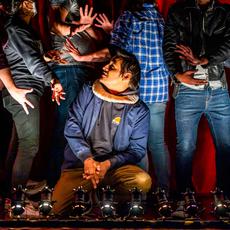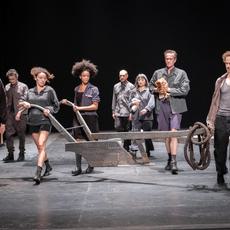
Make It Happen
Make It Happen
WORLD PREMIERE
Brian Cox stars in this biting satire on the Scottish banking ambition that shattered the global economy.
Behold the rise, fall and fail of the biggest bank in the world – The Royal Bank of Scotland (RBS).
At the helm is Fred 'The Shred' Goodwin, armed with an unshakeable belief in the wisdom of the ‘founder of modern capitalism’, Adam Smith. The once prudent RBS soars and then plummets, placing Scotland at the heart of the global financial crash of 2008.
Set in Edinburgh, Make It Happen sees legendary actor Brian Cox return to the Scottish stage for the first time in a decade as Adam Smith, the ghost of fiscal past. Following his outstanding portrayal of the title character in Lanark at the International Festival, Sandy Grierson takes on the role of Goodwin. Written by James Graham (Sherwood, Dear England), hailed as one of the most influential and finger-on-the-pulse writers of our time, and directed by the award-winning Andrew Panton, this epic new satire delves into the unchecked growth, spiralling greed and nail-biting hubris that brought the world’s economy to its knees.
Take your seat for this unmissable drama; decadence, world-domination and a dizzying descent await.
This is a fictionalised satire, featuring a mixture of characters and incidents inspired by real-life events, with others entirely imagined.
James Graham is fast becoming the pre-eminent playwright of his generation.
Listen on Soundcloud or Spotify.
Supported by Sir Ewan and Lady Brown
Programme
This is a fictionalised satire, featuring a mixture of characters and incidents inspired by real-life events, with others entirely imagined.
A keepsake freesheet is available at the venue for this performance.
Production Credits
CastCloseOpen
- Brian CoxAdam Smith
- Sandy GriersonFred Goodwin
- Sandy Batchelor
- Andy Clark
- Maya Bassi Curtis
- Callum Cuthbertson
- Charlotte Delima
- Hannah Donaldson
- Kirsty Findlay
- Lorraine Graham
- Graham Mackay-Bruce
- David Mara
- Ann Louise Ross
- Lawrence Smith
- Declan Spaine
- Gavin Jon Wright
Creative & Production TeamsCloseOpen
- James GrahamWriter
- Andrew PantonDirector
- Anna FleischleSet Designer, Costume Co-Designer & Video Co-Designer
- Emily Jane BoyleMovement Director
- Martin LoweMusical Supervisor, Composer & Arranger
- Phij AdamsMusic Technology
- Angelica RushCostume Co-Designer & Associate Set Designer
- Lewis den HertogVideo Co-Designer & Animator
- Tingying DongSound Designer
- Lizzie PowellLighting Designer
- Emily OultonAssociate Director
- Tom PennyAssociate Sound Designer
- Mikah SmillieAssociate Movement Director
- Stuart Burt CDGCasting Director
- Niall CasserlyMusical Director
- Gabriel MargolisAssistant Musical Director
- Will MortimerDramaturg
- Jean SangsterVoice Consultant
- Rachel Amey & Yvonne WaddellBSL Interpreters for 5 August performance
CreditsCloseOpen
- Co-produced by Edinburgh International Festival, National Theatre of Scotland and Dundee Rep Theatre and presented in association with Playful Productions and Neal Street Productions.
Dive Deeper
Listen to The Warm Up: your audio introduction to the performance.
Programme Note
At the 2025 International Festival, we have commissioned a series of expert essays to help you Dive Deeper into your Festival experience.
This essay on Make It Happen by James Graham explores how theatre can help us investigate the truth behind real-life socio-political events.

By James Graham
James Graham is an award-winning screenwriter and playwright whose stage work includes the Olivier Award for Best Play-winner Dear England and the Critics’ Circle Theatre Award-winner Best of Enemies. For television, he created and wrote Sherwood, which won the Royal Television Society Award for Best Drama and two BAFTAs and the Emmy-nominated Brexit: An Uncivil War.
Money Talks, Theatre Answers
17 years is a long time.
Nations rise and fall in that time. A baby born in 2008 might now be taking their driving test. 17 years is the gap between the end of the Second World War in the mid-forties and the release of the Beatles’ debut track at the birth of the swinging sixties.
And yet it feels like here, today, in 2025, we remain trapped, suspended still, in the inheritance of the 2008 financial crisis, having failed to adequately “reset”.
In the resulting carnage and pain it promised to be the end of one era and the beginning of the next. And yet I’d argue, as many do, that politically, socially and economically we have been limping on in the same state, carrying that baggage. That’s not to say it hasn’t been “dramatic” – spawning an age of uncertainty where prime ministers last only months, sometimes days; where reality stars become world leaders. Of wars and plagues.
But no new story, no revolutionary new “idea” seems to have arrived over the hills to garner mass consensus, as it did in the interregnum between other epochs.
Are we still in the long shadow of 2008?
I’m a writer who really loves and geeks out over processes and systems. I enjoy putting institutions on stage – the men’s England football team in Dear England, the Houses of Parliament in This House, Fleet Street in Ink, and game shows in Quiz. I enjoy looking at these pillars of our public life at a crossroads or in crisis, wondering what their idiosyncrasies tell us about ourselves, and Britain.
Banking and finance have always frightened me – is it too dry and impenetrable?
When the artistic director of the Dundee Rep Theatre, Andrew Panton, approached me a couple of years ago, however, the intimidating sprawling subject matter of the Global Financial Crisis coalesced around a more manageable, comprehensible idea.
Scotland.
And in particular, the collapse of the Royal Bank of Scotland, which – in 2008 – could claim to be the very largest bank on earth.
Artistic and cultural responses to 2008 have often been seen through an American lens – Lehman Brothers, and Bear Sterns, and Wall Street.
But here was the reasonable (and slightly mischievous) case being made for the financial crash to have a Scottish accent.
And of course it should. RBS had the largest balance sheet of any bank, globally, at the time, having been grown ruthlessly and mercilessly by its CEO – Fred Goodwin, who would become the face and perhaps the pantomime villains of the bank bailouts.
Capitalism was born in the streets of Edinburgh. And it nearly died there.
We had a Scottish Chancellor and a Scottish Prime Minister – the latter of whom, Gordon Brown, personally led the global response to the crisis when other major economies where minded to ride it out.
And, if you want to go further back – and in our resulting play, Make It Happen, we do – then you could argue the very idea of free markets and capitalism was born in the Scottish Enlightenment 250 years ago by Adam Smith – the “father of modern economics”.
Capitalism was born in the streets of Edinburgh. And it nearly died there.
Partnering with the National Theatre of Scotland and Edinburgh International Festival – we embarked on a mass series of interviews with politicians, civil servants, economists and members of the public, to try to understand the moment.
And of course – Brian Cox. Who wanted to “return home” to Dundee and tell a story that he hoped would matter. When he suggested to me over a whisky that Adam Smith should be in the show, I assumed he meant Smith’s “ideas”, and I was like, “well, of course, I’m way ahead of you”, but he meant literally, as a character, a ghost. My initial horror (“this is a serious play, Brian!”) soon gave way to delight. An almost Dickensian morality tale, set in the gothic, haunted shadows of Edinburgh.
The wonderful Sandy Grierson has the unenviable task of trying to add understanding and nuance to a man I know audiences come holding strong feelings towards – “Fred the Shred”. But to try and know a man’s motivations seems to me a worthwhile exercise, even if we don’t and can’t excuse them.
In an age of post-truth and competing realities, I also think a lot about the responsibility of art in this space. Most of my plays fictionalise real stories and people. Doesn’t drama risk adding more alternative facts and obfuscating the truth, rather than revealing it?
I – of course – don’t think so. The Edinburgh International Festival’s provocation for their ambitious season this year is The Truth We Seek, and that’s all any play or drama based on real events can attempt to do. Ask questions in good faith, poke at old wounds, shine a light into the shadows. I believe plays should ask questions, and leave audiences to answer them.
And 2008 remains an illusive and uncomfortable question the world has thus far failed to answer. I hope theatre – and Adam Smith – can contribute something to that quest.
© James Graham
It is the minutiae and the detail that I think actually reveals a greater truth about these systems and these institutions that govern usJames Graham
Dates & Times
Booking Information including FAQs
Discover Affordable Ticket Options
There will be a post-show talk on 4 Aug. Post-show talks are an informal opportunity for you to connect further with artists. It will begin 10 minutes after the performance ends and is expected to last no more than 30 minutes. You are welcome to stay for as little or as long as suits you.





